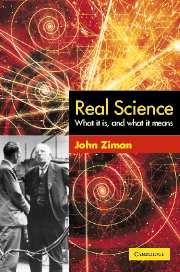Book contents
- Frontmatter
- Contents
- Preface
- 1 A peculiar institution
- 2 Basically, it's purely academic
- 3 Academic science
- 4 New modes of knowledge production
- 5 Community and communication
- 6 Universalism and unification
- 7 Disinterestedness and objectivity
- 8 Originality and novelty
- 9 Scepticism and the growth of knowledge
- 10 What, then, can we believe?
- Endnotes
- Bibliography and author index
- Index
4 - New modes of knowledge production
Published online by Cambridge University Press: 24 August 2009
- Frontmatter
- Contents
- Preface
- 1 A peculiar institution
- 2 Basically, it's purely academic
- 3 Academic science
- 4 New modes of knowledge production
- 5 Community and communication
- 6 Universalism and unification
- 7 Disinterestedness and objectivity
- 8 Originality and novelty
- 9 Scepticism and the growth of knowledge
- 10 What, then, can we believe?
- Endnotes
- Bibliography and author index
- Index
Summary
The academic mode
Science is a mode of knowledge production. Its social norms are inseparable from its epistemic norms – what philosophers call its regulative principles. Scientists' ideas about what should count as ‘the truth’ cannot be disentangled from the ways they work together in pursuing it. The philosophy of academic science is part and parcel of its culture.
The regulative principles of academic science are thus important components of its ethos. They are actually so familiar to most scientists, and are stated so often in different forms, that it is not easy to produce a standard list. The simplest way of describing them is to say that they involve such concepts as theory, conjecture, experiment, observation, discovery, objectivity, inference, etc., which we shall be analysing in detail in later chapters.
The significant point here is that although these are usually taken to be independent philosophical concepts they can be directly linked with sociological aspects of the academic ethos. For example, the norm of ‘communalism’ is closely connected with the principle of empiricism – that is, reliance on the results of replicable observation and experiment. Again, social ‘universalism’ is related to explanatory unification; ‘disinterestedness’ is normally associated with belief in an objective reality; insistence on ‘originality’ motivates conjectures and discoveries; ‘organized scepticism’ requires that these be fully tested and justified before being accepted as established knowledge. And so on.
This correlation with the Mertonian norms accords with our naturalistic approach.
Information
- Type
- Chapter
- Information
- Real ScienceWhat it Is and What it Means, pp. 56 - 82Publisher: Cambridge University PressPrint publication year: 2000
Accessibility standard: Unknown
Why this information is here
This section outlines the accessibility features of this content - including support for screen readers, full keyboard navigation and high-contrast display options. This may not be relevant for you.Accessibility Information
- 1
- Cited by
